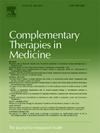Efficacy of biofeedback for migraine: A systematic review and meta-analysis
IF 3.5
3区 医学
Q1 INTEGRATIVE & COMPLEMENTARY MEDICINE
引用次数: 0
Abstract
Migraine, a severe headache accompanied by nausea, photophobia and phonophobia, can be controlled with pharmacological as well as non-pharmacological therapies. In biofeedback, patients learn to voluntarily modify their bodily reactions through feedback mediated awareness of physiological parameters, thus promoting relaxation, reducing stress and preventing migraine attacks. We aim to assess the efficacy of biofeedback on adult patients with migraine. Study protocol was registered on PROSPERO with reference number CRD42024606671. PubMed, Embase and Google Scholar were searched for randomized controlled trials from 2000 to 2024 in English that have evaluated the administration of biofeedback to the adult patients with migraine. High quality studies were included after RoB 2.0 Risk of Bias assessment. ANOVA with inverse variance weighting was used to compare mean differences across groups with 95 % confidence interval. Nine studies (558 participants) and three studies (278 participants) respectively qualified for comparison of biofeedback with waiting list control and active treatment. Biofeedback significantly reduced headache frequency and severity compared to waiting-list control. However, it showed no significant difference in headache frequency when compared to active treatments such as pharmacotherapy or cognitive behavioral therapy. Additionally, improvements in migraine-related disability, depression, anxiety, and quality of life were reviewed. This meta-analysis confirms that biofeedback is an effective non-pharmacological intervention for reducing headache frequency and severity in migraines. Additionally, it appears to provide synergistic benefits when combined with pharmacotherapy. However, future studies should focus on the cost-effectiveness and accessibility of home-based and app-based biofeedback to determine its broader clinical applicability.
生物反馈治疗偏头痛的疗效:系统回顾与荟萃分析。
偏头痛是一种伴有恶心、畏光和恐音的严重头痛,可以通过药物和非药物治疗来控制。在生物反馈中,患者通过反馈介导的生理参数意识,学会自愿地修改自己的身体反应,从而促进放松,减轻压力,预防偏头痛发作。我们的目的是评估生物反馈对成年偏头痛患者的疗效。研究方案在PROSPERO上注册,参考号为CRD42024606671。PubMed, Embase和谷歌Scholar检索了2000年至2024年的英语随机对照试验,这些试验评估了生物反馈对成年偏头痛患者的管理。经RoB 2.0偏倚风险评估后纳入高质量研究。采用方差反向加权的方差分析比较各组间的平均差异,置信区间为95%。9项研究(558名参与者)和3项研究(278名参与者)分别符合生物反馈与等候名单控制和积极治疗的比较。与等候名单对照相比,生物反馈显著降低了头痛的频率和严重程度。然而,与药物治疗或认知行为治疗等积极治疗相比,它显示头痛频率没有显着差异。此外,还回顾了偏头痛相关残疾、抑郁、焦虑和生活质量的改善情况。本荟萃分析证实,生物反馈是一种有效的非药物干预措施,可减少偏头痛的头痛频率和严重程度。此外,当与药物治疗联合使用时,它似乎提供了协同效益。然而,未来的研究应侧重于基于家庭和基于应用程序的生物反馈的成本效益和可及性,以确定其更广泛的临床适用性。
本文章由计算机程序翻译,如有差异,请以英文原文为准。
求助全文
约1分钟内获得全文
求助全文
来源期刊

Complementary therapies in medicine
医学-全科医学与补充医学
CiteScore
8.60
自引率
2.80%
发文量
101
审稿时长
112 days
期刊介绍:
Complementary Therapies in Medicine is an international, peer-reviewed journal that has considerable appeal to anyone who seeks objective and critical information on complementary therapies or who wishes to deepen their understanding of these approaches. It will be of particular interest to healthcare practitioners including family practitioners, complementary therapists, nurses, and physiotherapists; to academics including social scientists and CAM researchers; to healthcare managers; and to patients. Complementary Therapies in Medicine aims to publish valid, relevant and rigorous research and serious discussion articles with the main purpose of improving healthcare.
 求助内容:
求助内容: 应助结果提醒方式:
应助结果提醒方式:


